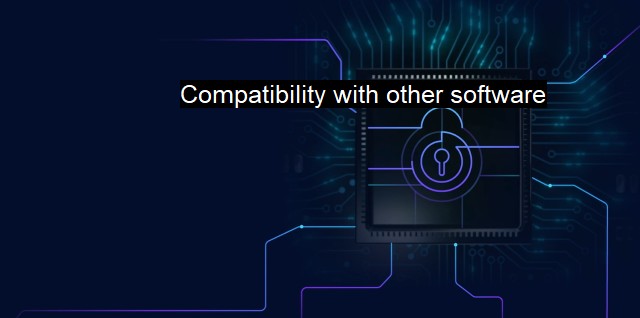What is Compatibility with other software?
The Critical Role of Interoperability and Compatibility in Today's Cybersecurity Landscape
"Compatibility With Other Software" refers to the ability of such systems to operate in harmony with numerous and varied sets of other software applications. Cybersecurity platforms are required to function within a vast ecosystem of applications, operating systems and hardware. Therefore, compatibility becomes imperative for effective security management. Interoperability—the ability for software platforms to function across diverse work systems—is an intrinsic part of compatibility.To understand the significance of compatibility with other software, let's consider an antivirus program. An effective antivirus program should be capable of operating alongside other non-security related tools (like productivity software, databases, etc.) and security tools as well (like firewall systems, spyware removers, etc.).
First and foremost, compatibility helps prevent conflicts between different software that can cause system performance issues like slowdowns, freezes, or crashes. Incompatible software can also lead to functionality issues where one or more features of the applications may not work properly.
For instance, if an antivirus system isn't compatible with an operating system update, the antivirus program could cease to function or even cause the entire system to become unstable. This presents a potential cybersecurity risk as the antivirus software, designed to monitor and combat threats, is now ineffective and leaves the system vulnerable. Clearly, such scenarios depict that ensuring a high degree of antivirus-software compatibility is necessary.
In addition to preserving system performance, compatibility with other software plays a significant role in online security. An incompatible antivirus program may actually hinder the operations of a cybersecurity tool, rendering it less effective or even inoperative, thus leaving the system susceptible to threats. Insisting on software compatibility ensures that various cybersecurity tools can work cohesively, maintaining a secure online environment.
For an organization implementing cybersecurity measures, the ability for chosen antivirus applications to operate in sync with existing infrastructure is critical. Organizations could be utilizing different IT system structures, using various operation systems or diversified sets of software. Hence, a cybersecurity application needs to be compatible with prevalent software to ensure that the whole gamut of organizational tasks remains unaffected while simultaneously warding off the cyber threats.
Another benefit of software compatibility hinges on improved efficiency. With compatible software tools, various applications can work together, sharing information securely, and quicken the apprehension and response for any cybersecurity threat. For instance, a centrally managed cybersecurity system would need to interact efficiently across an organization, from security information and event management (SIEM) software to firewalls and intrusion detection systems.
It's pertinent to remember that compatibility creates flexibility. In today’s world, where agile responses are vital for success, being flexible allows reacting to evolving threats more efficiently. An antivirus program that is compatible with a wide range of applications remains adaptive and open for future security requirements.
Despite the apparent benefits, ensuring compatibility is not devoid of challenges. Legacy systems, integrations across diverse platforms, custom-built applications, or cloud-based services present significant problems when it comes to maintaining broad compatibility. Comprehensive testing methods and practices are required to validate satisfactory operation in real-world conditions across these multi-vendor, multi-technology environments.
Rapid technological progression means the IT landscape is continually evolving, making it even more challenging to maintain compatibility. Software updates can invalidate certificates of compatibility at a moment's notice.
The compatibility of cybersecurity and antivirus software with other system applications is indispensable to ensure seamless operation and effective security. Compatibility not only saves systems from potential crashes or blackouts but also facilitates effective cooperation between different software tools to enhance overall cybersecurity. As cyber threats continue to expand in sophistication and frequency, software compatibility remains an essential asset in the multifaceted effort to secure cyberspace.

Compatibility with other software FAQs
What software is compatible with my antivirus program?
The compatibility of your antivirus program with other software depends on the specific program and its design. Some antivirus programs may work well with certain types of software, while others may not be compatible at all. It is important to check with the manufacturer or website of your antivirus software to see what other programs they recommend for use alongside their product.What happens if I try to use incompatible software with my antivirus program?
Using incompatible software with your antivirus program can cause conflicts and potentially compromise the security of your system. It may also result in reduced performance and may cause your system to crash or become unstable.Is there any way to determine if two software programs are compatible?
Yes, you can usually find information about software compatibility on the manufacturer's website or by searching online forums and user reviews. It is always a good idea to do some research before installing new software to ensure that it will work well with your current antivirus program.Can I install multiple antivirus programs on my computer to increase security?
No, it is not recommended to install multiple antivirus programs on one computer as they can interfere with each other and cause conflicts. Additionally, it can also slow down your system and may compromise the overall security of your computer. It is best to choose one reputable antivirus program and ensure that it is kept up-to-date and running properly.| | A | | | B | | | C | | | D | | | E | | | F | | | G | | | H | | | I | | | J | | | K | | | L | | | M | |
| | N | | | O | | | P | | | Q | | | R | | | S | | | T | | | U | | | V | | | W | | | X | | | Y | | | Z | |
| | 1 | | | 2 | | | 3 | | | 4 | | | 7 | | | 8 | | |||||||